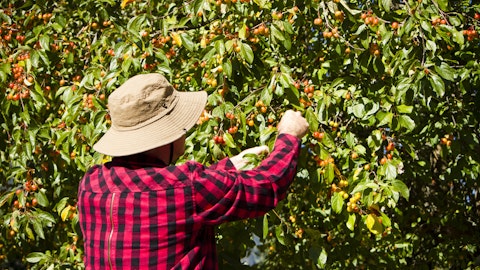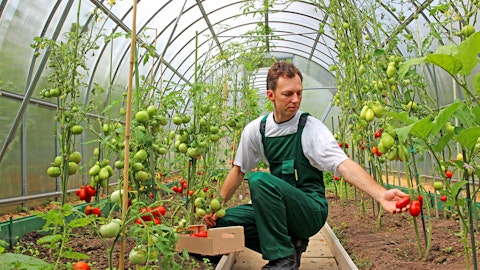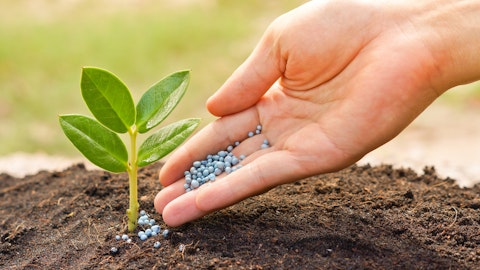Mark Douglas: Yes. I mean the new products are really targeted at Latin America. I’m not going to give the numbers for that because I don’t want to give away any competitive information on how well we’re doing. But we already have significant interest from our partners in the channel, whether it’s distribution, co-ops or large growers for these new products. So, we’re very excited about bringing those products to market. And so far, the interest that we’ve generated with our growers is very, very positive.
Operator: Our next question comes from Aleksey Yefremov from KeyCorp.
Unidentified Analyst: This is Paul on for Aleksey. Can you walk us through some of the adverse weather conditions you are seeing and where inventory levels stand in those regions? Thanks so much.
Mark Douglas: Yes. Listen, I just made a comment earlier about weather. I mean, we’ve had in the first half of the year, obviously, very difficult conditions in the south of Brazil and Argentina through drought. We’re seeing dry conditions in the Midwest of the U.S., very dry conditions in the South of Europe as you go through Spain, France, Italy, Greece, Turkey. We also have seen flooding in China, flooding in the north of India, dryness in the south of India, dryness in Australia. I mean the list goes on and on. We’re dealing with more weather volatility than we ever have over the last year. So those are the types of things that mother nature throws at us. And of course, mother nature doesn’t care about the financial quarters that we have to deal with but that’s something that we all have to manage as we play in the agricultural field. But it’s certainly real. And in some countries, it’s very, very impactful.
Unidentified Analyst: Great. And as a follow-up, as raw materials and the logistics environment start to normalize, do you see the supply of more competitive products entering the market?
Mark Douglas: I guess, you mean from a generic standpoint, from a — what you mean from a — could you just elaborate a little bit more what you’re looking for?
Unidentified Analyst: Yes, yes, from a generic standpoint.
Mark Douglas: Listen, generics play a major role in the marketplace. They have been around and they are around. We don’t necessarily play in a lot of those markets. It’s not to say that the markets they play in are not valuable, they are. But we don’t have a lot of generic pressure in a lot of our product lines, mainly because of how we differentiate through either new active ingredients or new formulations that we bring to market. So, I expect the generic market to get more competitive, but we don’t play in that space.
Operator: Our next question comes from Richard Garchitorena from Wells Fargo.
Richard Garchitorena: Great. Thanks. My question, just from a bigger picture, you mentioned that the macro environment has changed the way that your customers have been managing inventories. Is there any change in terms of what you think about in terms of what the mid-cycle sort of earnings generation of the business is? Should we look at $1.4 billion sort of like as a good base to move from going forward?
Mark Douglas: Yes. This is a very good question. I mean, in November, we’re going to give you a view of our world going forward for the next three years and then a longer-term aspiration. But we’ve been clicking along at a fair rate of 5% to 7% top line, 7% to 9% bottom line. We just did a look back and we’ve outgrown the market anywhere from 1.5 times to 2.5 times over the last 20 years. So we know we have a model and a portfolio that can deliver that type of growth. I do think thinking of this year as a reset is a good way to think about it, and then how do we bring the next generation of growth to the Company. I don’t see it as some massive rebound next year. I don’t think that’s going to happen. I think the channel is learning the lesson of carrying the right amount of inventory.
So I think we’ll reset this year. And then we’ll move forward, and we’ll share with you in November what we think that potential new algorithm will look like in terms of top line, EBITDA and EPS growth going forward.
Richard Garchitorena: Okay, great. And just as a follow-up, how has the biological business impacted at all the change in the market environment? Do you still see 7% to 8% CAGR growth for the next few years? I know we get an update in November but any thoughts on that right now would be great. Thank you.
Mark Douglas: Yes. I mean, listen, I don’t think there’s a single piece of this crop protection market that has not been impacted in the same way, whether they’re biologicals or micronutrients or whatever the product you’re bringing to market. I think everything has been impacted by the significant reset we’re seeing. Now, having said that, we still have expectations that the plant health business will grow in that 20-plus-percent range. The biologicals are growing even faster. We’ll continue to see that accelerate as we invest more, especially in R&D. So, we see that continuing. It’s not something that we feel has been hampered long term by this recent reset. If anything, it teaches us that having that broader portfolio is going to help us going forward from a value perspective. So, we do see plant health as it continues to be a major focus for us, and the biologicals will continue to outpace the rest of the Company by some degree.
Operator: We have our last question comes from Joel Jackson from BMO.
Unidentified Analyst: This is Joseph on for Joel. So just to help get volumes moving again, would FMC consider increasing rebate programs in the second half to help pull forward some volumes from first half 2023?




